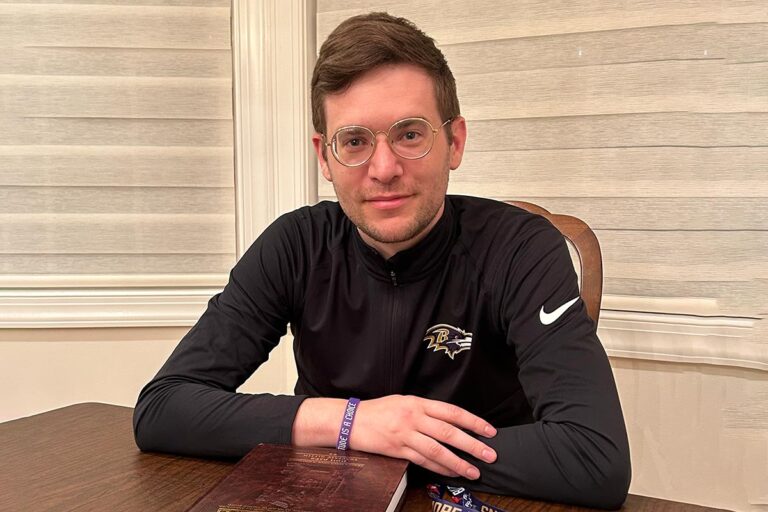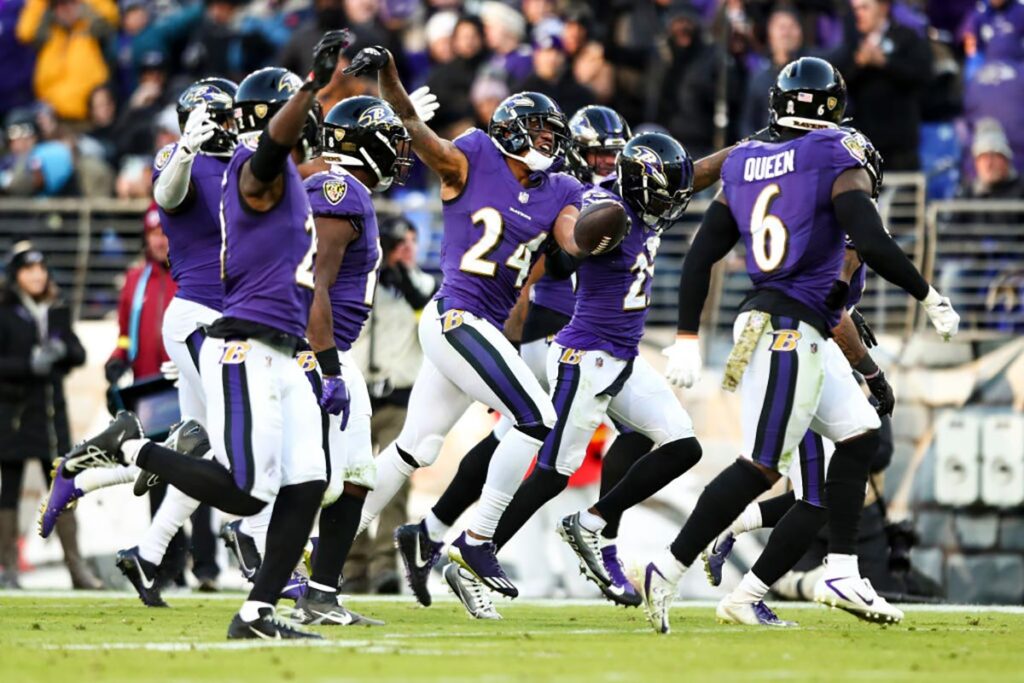
Adam Neuman, the new chief of staff and special advisor to the president with the Baltimore Ravens, requests me on LinkedIn just a few minutes into our phone call.
“It is such an underrated resource,” he said about the platform, at the start of our conversation. “You can Google someone’s name, find them on LinkedIn and see if they went to law school, have an MBA, or interned for a football team.”
Analyzing successful people’s career trajectory is a great way to map out one’s own path to success, he added.
Through the course of our conversation, it became clear that the 33-year-old sports executive had much more wisdom to offer, from how to balance commitments to Judaism and one’s career to advocating for mental health in sports. Here are some of the highlights.
Neuman’s path to the Baltimore Ravens: “Uncommon effort” and relationships

I kicked off our discussion by asking the basics: How did an Orthodox Jewish kid from Baltimore who went to Yeshiva University end up as the chief of staff of the Baltimore Ravens? Neuman responded that he has approached his career with “purpose and intentionality.”
“What I tell people is to try and be really intentional about your decisions, and doing things that are uncommon. If you want to achieve uncommon results, you have to put in what I believe is uncommon effort,” he said.
Demonstrating this uncommon effort early on, Neuman recounted his time interning with the Minnesota Vikings’ legal department.
“When I got there, I knew I needed to differentiate myself, so I would go in early and stay late,” he said. When he completed his legal tasks, he would proactively offer his help to take on additional responsibilities.
He stressed the importance of “hustling” and going above and beyond networking while being a student. “Networking requires a level of chutzpah, but relationship building is a whole other level,” he said. “It’s about actually caring about someone, remembering their names, their birthdays. It’s doing things for them without expecting anything in return.”
To illustrate his commitment to relationship-building, he shared some ways he nurtures these connections — for example, offering tickets to sports events or sending personalized thank you notes.
Unlike many of his law school peers who opted for exotic travels during breaks, Neuman chose to deepen his internship experience in Eden Prairie, Minnesota, to gain more exposure to the NFL.
Unfortunately, despite his best efforts, after graduating from law school, Neuman was not able to land a job with the Vikings. “There was just no position,” he recalled. “I was bummed. It was a setback.”
He ultimately accepted a corporate associate position at a prominent law firm based in New York, but continued to cultivate connections within the sports industry.
“I just found a way to stay in touch with the Vikings,” he said. “I hoped that if there were ever an opportunity, [they] would reach out to me.”
His persistence and relationship-building paid off. When Kevin Warren, previously the Vikings’ COO, became the commissioner of the Big Ten Conference, he recruited Neuman to serve as his chief of staff in the strategy and operations department.
This marked a turning point in Neuman’s career. After nearly four years, the Baltimore native found himself returning to his roots when he was offered his current position with the Ravens. In his role, he provides strategic advice to the president and manages a wide range of operational tasks.
Navigating Orthodox Judaism and the world of sports

Throughout his stellar career, Neuman has also had to reconcile his religious commitments, particularly his observance of kashrut and Shabbat.
Although he doesn’t see himself as directly carrying the torch of representation (“I don’t wake up in the morning and feel like I’m representing the Jews; I just try to represent myself the best way possible, as I would in any job”), Neuman holds a deep appreciation for Jewish wisdom, which has significantly influenced both his professional and personal life.
“Judaism is a life book,” he said. “It’s more than rules about what to do or not do; it’s a guiding light that teaches you how to behave in all situations. It’s a part of a general rubric, a book of advice.”
His commitment to tzedakah (charity or righteousness), he shared, is “rooted in Biblical values, seeing how Abraham treated guests, even when he himself was in pain recovering from surgery.”
In fact, Neuman sees a clear connection between his religion and sports.
“Judaism and sports both teach you how to win, how to lose like a mensch, how to compete, how to comport yourself in all types of situations,” he said, alluding to the Torah as a behavioral guidebook — how to treat people kindly, be inclusive, give your best, act decently, reach out to those in need, and more.
However, practicing his Jewish faith within the sports industry hasn’t been without its challenges. “Antisemitism is prominent and sad,” he said.
He reflected on times when reporters highlighted his observance of Shabbat as a potential hindrance, questioning his former bosses on how he could reconcile his religious commitments with an American work culture that demands constant online availability.
“You prove them wrong with your actions and your ability to just do the job,” he said, sharing his strategy for confronting such biases. “I believe…that will speak the loudest. I’ve always found that my greatest role models do a lot less speaking and a lot more doing.”
When it comes to balancing his faith and sports career, Neuman believes in establishing “non-negotiables.” “If your ‘non-negotiable’ is you keep kosher, then you keep kosher,” he said.
He considers observing Shabbat as another non-negotiable, noting that “one can’t be flexible on everything in life” and should feel comfortable skipping a meeting that falls on Shabbat, but be sure to catch up with everyone after nightfall.
Focusing on mental health in the NFL
Neuman firmly believes in addressing mental health issues that have had a significant impact on the sports industry, NFL included, over the years.
Throughout his career, he has championed the cause in various ways. As the chief of staff, strategy and operations for the Big Ten Conference, Neuman helped launch a mental health initiative to promote wellness across college campuses, which included creating an app for students.
Neuman candidly discussed the issue in a 2020 interview with Unpacked, stating, “Mental health is a silent epidemic. There is no silver lining in mental health — nobody is patting you on the back when you go to a therapist. It’s very secretive, it’s very inhibited, people are scared to talk about their emotions.”
He considers player safety a critical factor. In his new role, he hopes to carry that message forward by prioritizing safety in all aspects. “It’s not only good for humans, it’s good for business,” he said matter-of-factly.
For college students navigating the pressures of academics, antisemitism, social media, and maintaining mental health, Neuman’s advice is inspiring yet practical.
He encourages them to “keep climbing the mountain,” reminding them that “a hard moment doesn’t always translate into a hard life.” The sports executive also emphasized the importance of choosing the right company, saying, “Make sure you surround yourself with good people.”
As we wrapped up our discussion, I couldn’t help but ask one last burning question: would the Ravens win the Super Bowl this year? Neuman’s response was predictably optimistic and carefully measured.
“I think they have the talent, perseverance, incredible coaching staff, players, fan base and folks on the business side that are rooting for them,” he said. “They’ve done it twice before so, why not?”
Originally Published Aug 4, 2023 04:38PM EDT
